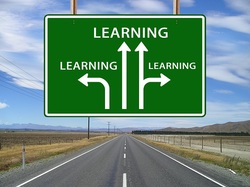1) A child learns to play a video game by exploring it on his own.
2) A child learns to play a video game by watching a more experienced player.
3) A child learns to play a video game by being taught by a more experienced player.
In my experience a lot people take the first of these scenarios to be the most natural type of learning—we explore on our own. The third scenario has its place, but direct instruction from someone is a bit contrived compared to our own experience.

Now a fascinating paper by Patrick Shafto and his colleagues (2012) (that’s actually on a rather different topic) leads to implications that call into doubt the idea that exploratory learning is especially natural or authentic.
The paper focuses on a rather profound problem in human learning. Think of the vast difference in knowledge between a new born and a three-year-old; language, properties of physical objects, norms of social relations, and so on. How could children learn so much, so rapidly?
As you're doubtless aware, from the 1920's through the 1960's, children were viewed by psychologists as relatively passive learners of their environment. More recently, infants and toddlers have been likened to scientists; they don't just observe the environment, they reason about what they observe.
But it's not obvious that reasoning will get the learning done. For example, in language the information available for their observation seems ambiguous. If a child overhears an adult comment “huh, look at that dog,” how is the child to know whether “dog” refers to the dog, the paws of the dog, to running (that the dog happens to be doing), to any object moving from the left to the right, to any multi-colored object etc.?
Much of the research on this problem has focused on the idea that there must be innate assumptions or biases on the part of children that help them make sense of their observations. For example, children might assume that new words they hear are more likely to apply to nouns than to adjectives.
Many models using these principles have not attached much significance to the manner in which children encounter information. Information is information.
Shafto et al. point out why that's not true. They draw a distinction between three different cases with the following example. You’re in Paris, and want a good cup of coffee.
1) You walk into a cafe, order coffee, and hope for the best.
2) You see someone who you know lives in the neighborhood. You see her buying coffee at a particular cafe so you get yours there too.
3) You see someone you know lives in the neighborhood. You see her buying coffee at a particular cafe. She sees you observing her, looks at her cup, looks at you, and nods with a smile

In the second scenario, we anticipate that the neighborhood denizen is more knowledgeable than we--she probably knows where to get good coffee. Finding good coffee ought to be much faster if we imitate someone more knowledgeable than we. At the same time, there could be other factors at work. For example, it's possible that she thinks the coffee in that cafe is terrible, but it's never crowded and she's in a rush that morning.
In the third scenario, that's highly unlikely. The woman is not only knowledgeable, she communicates with us; she knows what we want to know and she can tell us that the critical feature we care about is present. Unlike scenario #2, the knowledgeable person is adjusting her actions to maximize our learning.
More generally, Shafto et al suggest that these cases represent three fundamentally different learning opportunities; learning from physical evidence, learning from the observation of goal-directed action, and learning from communication.
Shafto et al argue that although some learning theories assume that children acquire information at random, that's likely false much of the time. Kids are surrounded by people more knowledgeable than they. They can see, so to speak, where more knowledgeable people get their coffee.
Further, adults and older peers often adjust their behavior to make it easier for children to draw the right conclusion. Language is notable in its ambiguity-“dog” might refer to the object, its properties, its actions—but more knowledgeable others often do take into account what the child knows, and speak so as to maximize what the child can learn. If an adult asked “what’s that?” I might say “It’s Westphalian ham on brioche.” If a toddler asked, I ‘d say “It’s a sandwich.”
One implication is that the problem I described—how do kids learn so much, so fast—may not be quite as formidable as it first seemed because the environment is not random. It has a higher proportion of highly instructive information. (The real point of the Shafto et al. paper is to introduce a Bayesian framework for integrating these different three types of learning scenarios into models of learning.)
The second implication is this: when a more knowledgeable person not only provides information but tunes the communication to the knowledge of the learner, that is, in an important sense, teaching.
So whatever value you attach to “naturalness,” bear in mind that much of what children learn in their early years of life may not be the product of unaided exploration of their environment, but may instead be the consequence of teaching. Teaching might be considered a quite natural state of affairs.
EDIT: Thanks to Pat Shafto who pointed out a paper (Csibra & Gergely) that draws out some of the "naturalness" implications re: social communication.
Reference
Shafto, P., Goodman, N. D. & Frank, M. C. (2012). Learning from others: The consequences of psychological reasoning for human learning. Perspectives in Psychological Science, 7, 341-351.
 RSS Feed
RSS Feed